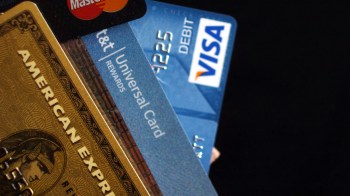How safe are credit cards now?
Tess Vigeland: Jeff mentioned that people are more inclined to put money in a tip jar than to put a small gratuity on plastic. Maybe it’s because they’re afraid of getting a fee tacked on to that credit transaction! That fear would’ve been justified over the last several years as credit cards added ding after ding to bills and purchases.
But a little over a year ago, Congress passed the Credit Card Act to crack down on some of the more egregious bank behavior. A new report from the Pew Safe Credit Cards Project finds that for the most part it worked.
Nick Bourke is the project’s director. Welcome to the program.
Nick Bourke: Thank you.
Vigeland: Based on this report, it sounds like the credit card has done a lot of what it was supposed to do, at least when it comes to interest rates and some fees?
Bourke: Yes, it has. Based on our research, we’re looking at a situation where 100 percent of credit cards used to have practices that regulators called “unfair and deceptive.” Now, those practices have gone away, but we have credit cards that don’t have annual fees, we have lots of credit cards that still look pretty good for consumers.
Vigeland: Can you give us some numbers on that?
Bourke: So one of the claims we heard before the Credit Card Act was that the elimination of these practices that regulators were going after would lead to drastic increases in prices and additions of new fees, including annual fees. So we’ve been tracking that. And what we’ve found is that even today, about one in five credit cards has an annual fee. That’s up only slightly from last year and only slightly from a few years ago. And the size of these fees has not gone up in the past year. For banks, the median annual fee is $59 and for credit unions, the median annual fee is $25.
Vigeland: But the big problem here, of course, is that the banks have found so many other ways around the legislation, right? I mean, you released a different study a couple of weeks ago about checking account fees and those are skyrocketing and you have these long disclosure statements now about those.
Bourke: Absolutely. It’s a constant challenge to make the market work in a way that is profitable, yet also transparent and not harmful for consumers. And so, whether you’re talking about clear disclosures, which is something that we really need to work on with checking accounts or while you’re talking about on-going adjustments to the credit card industry as it finds its new equilibrium, there are a lot of challenges that regulators need to continue working on.
Vigeland: Can you give us a quick rundown of the checking fee study that you did?
Bourke: The median length of a checking account disclosure is 111 pages.
Vigeland: Good Lord.
Bourke: And it’s even worse than that because a consumer, if they really want to inform themselves about what’s happening, they can’t just look at the first couple of pages of that. They really have to skim through 111 pages of material to find all of the relevant information about fees and how are you going to credit my check and how it’s going to debit the checks that I use.
Vigeland: Well, if the upshot of your study over the last year for credit cards is that that legislation actually did work and did what it was supposed to do, what do you think is still missing from consumer protections?
Bourke: I think what we need to focus on with credit cards is making sure that there’s on-going clear transparency and to make sure new problems don’t develop. One issue that we’ve been watching is promotions and offering deferred payments — you know, “Zero percent interest for 12 months,” that sort of thing.
Vigeland: What’s wrong with that?
Bourke: The only reason that a deferred interest program is offered is because a merchant wants to sell more product or because a lender wants to gamble that a certain percentage of people who take out these deferred loan programs will not be able to pay in full at the end or will make a mistake. It’s a big issue for them, because if you take out $1,000 deferred payment loan and at the end of the term, the 12 months or whatever it is, if you haven’t paid all of that $1,000, you’re going to get hit with interest on the full $1,000 all the way back to the origination date, no matter what you’ve paid along the way.
Vigeland: Good cautionary tales. Nick Bourke is the director of Pew’s Safe Credit Cards Project and we’ve been talking about their recent study on the Credit Card Act. Thanks so much for coming in.
Bourke: Thank you. It was a pleasure.
There’s a lot happening in the world. Through it all, Marketplace is here for you.
You rely on Marketplace to break down the world’s events and tell you how it affects you in a fact-based, approachable way. We rely on your financial support to keep making that possible.
Your donation today powers the independent journalism that you rely on. For just $5/month, you can help sustain Marketplace so we can keep reporting on the things that matter to you.


















